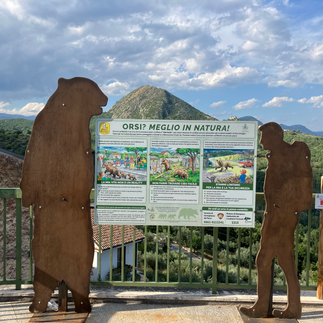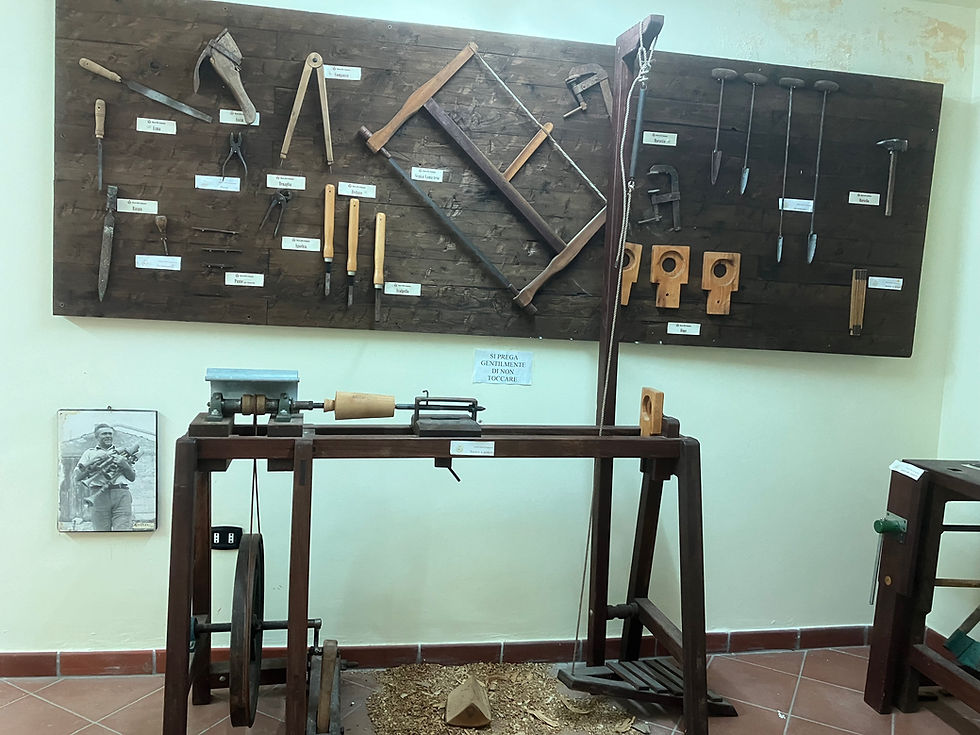Orsi? Meglio in Natura!
- Antonio Forte
- Aug 5, 2023
- 4 min read
Bears? Better in Nature! Yes, there are bears that inhabit the Molise mountains, although I have yet to encounter one on my daily hikes. But, a few more things about the Zampogna festival. After I had inquired at the Zampogna museum about purchasing a ciaramella, the small oboe- or shawm-like instrument that often accompanies the Zampogna, I was brought by one of the curators to a small shop with many of the instruments on display. I chose one of the many carved olive wood instruments and payed for it. It came with two reeds, or l'ancia, that were constructed from what looked like thin credit card plastic bound with thread to a clear plastic straw. I asked if there were wood reeds for it, but the gentleman insisted that the plastic was modern and would last longer. I was skeptical, but tried out a scale and a few short melodies. All was shrill and nasally sounding, and I mumbled rumore, come un gatto morendo (noise, like a dead cat). I turned to the signora who had helped me find the place, and to the two signori in the shop, and said, forse...devo provare a casa... (perhaps I need to practice at home). I'm not sure they shared in my humor or musical intrigue. I payed for the ciaramella, put it gingerly in my backpack, expressed my gratitude to them, and proceeded to walk onwards. Again, I followed my ears to where the zampognari were playing their zampogne in the town piazza.
[Caption: More Carnival of Venice played by a ciaramella and accordion.]
I soon came across a stall with a table displaying all sorts of hand-made ciaramelle, oboes, chanters, and even a chalumeau. Behind the table sat a gentleman who every passerby seemed to stop and greet, hug, or shake hands with. Scusi signore, I said once I saw he was free a moment. Ho una domanda: l'ancia per la ciaramella, quale materiale è meglio, plastica o legno? (Excuse me, sir. I have a question: which material is better for ciaramella reeds, plastic or wood?) He corrected me, using the word canna (cane) instead of legno (wood), and said that the cane was much better, would last longer, had the best tonal qualities, and was proper and traditional. I explained that I had just purchased a ciaramella from up the street and was given plastic reeds. He beckoned me to sit in the chair next to him and asked me to take out the instrument. He took a look at the instrument, took a look at the reeds, and, shaking his head, seemed as skeptical as I had felt. Over the next few hours (or what seemed like over an hour to me) he and I sat; he making a meticulous and expert inspection of the ciaramella, and I asking questions about his process. While he fastened a new hand-made brass reed receiver, mia invenzione! he proudly declared, into the small opening, which was too large to fit his own hand-made l'ance, I explained why I was in Italy, and the fact that my great-grandparents had been Molisani before emigrating to America over a century ago. I introduced myself as Antonio Forte il Quarto (Antonio Forte the fourth, as I am the fourth Antonio, patrilineally, in my family). He introduced himself as Luigi Carini. From time to time Luigi would pause his work to greet one of the many admirers who passed by, introducing me to each one as il ex-Italiano (the ex-Italian). As he tuned each and every note, using tiny bits of bees wax to make certain of the finger holes smaller, or drill bits spun by hand to make certain of the other holes larger, we continued to chat. He took out two brand new l'ance di canne, and made fine adjustments to them. Luigi also explained his tuning process, and that the proper measurement for each note was the distance between the edge of l'ancia and each finger hole. We quickly became good friends.
[Caption: Watch out for bears. Spectacular skies and streets of Scapoli. My new friend Luigi.]
Once Luigi was finished, he asked me to play a little bit to make sure everything was working. It was a completely different-sounding instrument from what I had first purchased. He made an invoice for the brass reed adapter and the two l'ance di canne. I reached to hand him the Euros, but said, ma anche devo pagare per il tuo tempo! (But I must also pay you for your time!). Luigi just furrowed his brow, shook his head once, and said quietly but resolutely in English, "I enjoy my work."
I thanked him vigorously and sincerely for sharing his expertise, his time, and conversation with me, il ex-Italiano. He laughed and shook my hand. He insisted on exchanging phone numbers and emails, and said I could contact him at anytime with questions. Before departing, I asked if over video chat in the future he could teach me i canzoni tradizionali Molisani (traditional songs of Molise). He said of course, and that he was at my disposal so that come the next Zampogna Festival we could play together.
[Caption: Luigi tunes another ciaramella.]
Stay tuned for the next post. Still no bears, but una caccia al tesoro (an Italian scavenger hunt).









Luigi seems like the coolest dude! Hope you keep in touch with him, it would be so cool if y'all played together at the next Zampogna Fest haha
awesome ❤️ I am so enjoying reading about your adventures. Thank you Antonio.
What a fantastic encounter!
Too intriguing for my minuscule intelligence. Very happy for you.
Excellent report - I’m also watching out for bears here in DC